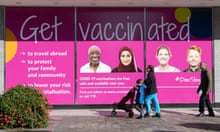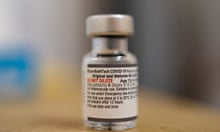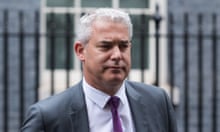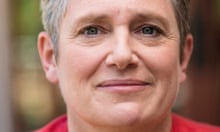The government’s vaccines watchdog is understood to have approved the idea of second Covid vaccinations for teenagers aged 16 and 17, putting in place another element of plans to boost protection from the virus into the winter.
The Joint Committee on Vaccination and Immunisation (JCVI) decided in favour of first jabs for the age group in early August, saying at the time it was likely that second shots would begin 12 weeks after the first dose.
However, it is now nearly 12 weeks since the initial decision, with some parents reporting that GPs were telling teenagers they would need to wait until they were 18 for their second dose.
While the department of health said it had no information about an imminent announcement on second vaccinations for the age group, it is understood that news could come on it next week.
However, the JCVI appears to be undecided on another issue: whether the programme of third “booster” jabs could be speeded up by reducing the permitted gap between doses, something described by Boris Johnson on Friday as “an important question”.
Prof Anthony Harnden, deputy chair of the JCVI, indicated that it might be possible to shorten the minimum gap between a second and booster jab to five months from the current six.
The JCVI had advised six months “because that’s what the data shows is the sweet spot”, he told the BBC, but added: “Whether it’s five months or whether it’s seven months isn’t so important, but I think what is important is that people get that booster dose.”
But in another interview on Times Radio, Harnden said the idea of shortening the gap was not “the prime issue at the moment”. Others on the JCVI are understood to be resistant to the idea, arguing that it has no clinical benefit and six months should be seen as a minimum.
Booster vaccinations are now open to people aged 50-plus, those with underlying health conditions, and frontline health and care workers, totalling about 30 million people across the UK.
Between 200,000 and 250,000 jabs are now being administered a day, with 5m done so far, meaning that at the current pace it would not be completed until the new year.
Ministers see boosters as a key element in trying to ensure England does not face new Covid restrictions in the winter due to pressures on the NHS, with a series of studies indicating that a third injection can significantly increase protection against the virus.
Johnson visited a vaccination centre in west London on Friday, part of an effort to promote the booster programme, and said older people in particular were vulnerable to the “serious effects from waning immunity”.
He said: “I think that people should be coming forward with the same spirit of determination to get their boosters as we saw earlier on this year. It’s a very good thing to do. It gets you a huge amount of protection and we always expected that we would see numbers rise right about now. That is happening.”









